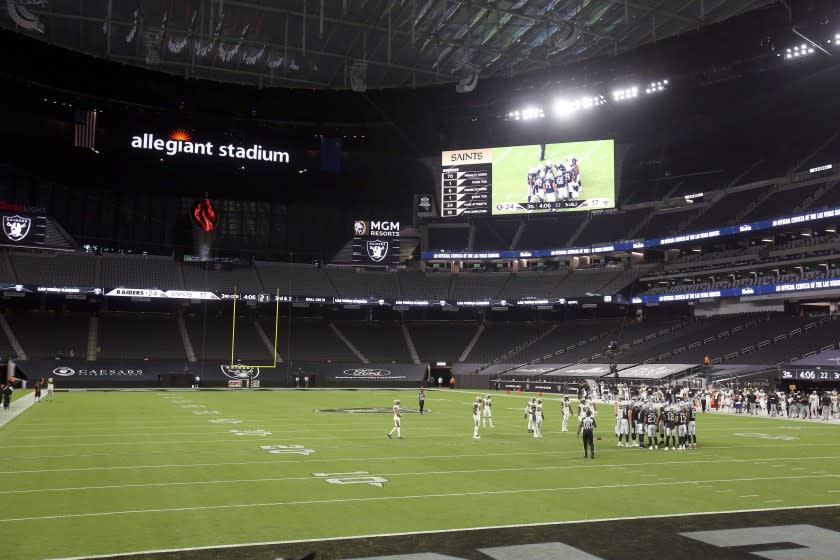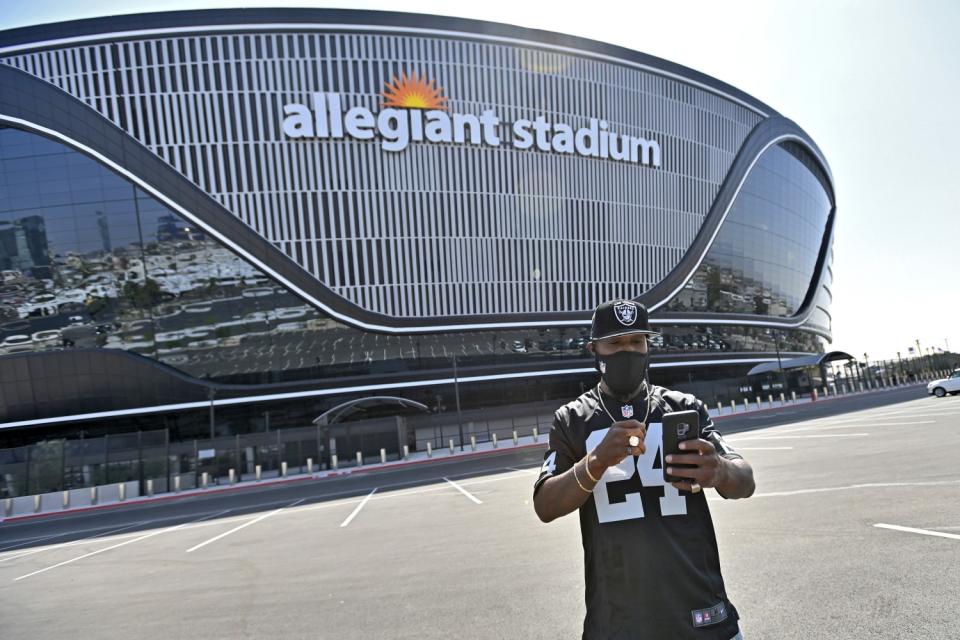Hernández: Raiders open new stadium in Vegas minus fans, much to disappointment of L.A. travelers

Los Angeles’ football team is 2-0.
So are the Rams.
In retrospect, however, the story Monday night wasn’t how the Raiders downed the New Orleans Saints 34-24.
In fact, the story wasn’t even here, not in this empty stadium, where they played for the first time.
More telling was what happened outside, around their new hometown.
“Amazing,” Kyle Collins said.
Collins is the general manager of Tommy Rocker’s Mojave Beach Grill, less than two miles from Allegiant Stadium. The restaurant was at capacity of 160 patrons for the viewing party it hosted for the game in which Derek Carr passed for three touchdowns.
Fans watched the Raiders rally from a 17-7 deficit with 24 consecutive points, then ice the game on Daniel Carlson’s 54-yard field goal.
There weren’t any television monitors outside, but fans gathered there too. Five canopies and a beer stand were set up in the parking lot.
“It’s not even people from Las Vegas,” Collins said when reached by phone at the restaurant.

So the Raiders have done it again. They have abandoned not one but two markets and convinced their fans to follow them.
This time, into the desert.
And that’s with newly opened Allegiant Stadium closed to fans for the entirety of their maiden season in Las Vegas because of COVID-19 protocols.
Twenty-six years after they traded the Coliseum in L.A. for the Coliseum in Oakland, approximately 15% of their season-ticket holders are from Southern California, according to a person familiar with the situation who spoke under the condition of anonymity.
On ticket-reselling website Vivid Seats, the Raiders accounted for 27% of NFL-related searches from L.A.-based customers in the two months before teams placed restrictions on fans’ attendance.
The Rams were at 19%.
More searches for Raiders tickets on vividseats.com originated from L.A. than any other city, including Las Vegas, according to the company.
“From a ticket perspective, one could argue that Los Angeles is still a Raiders town,” Stephen Spiewak, Vivid Seats’ digital content marketing manager, wrote in an email.
Some of this was expected. When the Raiders were in Oakland, fans traveled from Los Angeles to watch them every other week.
But it’s one thing to drive upstate to tailgate for several hours and watch a game in person. It’s another to show up to a stadium that can’t be entered.
As crazy as that sounds, that’s what many people did, from both L.A. and the Bay Area.
The day before the game, the parking lots at Allegiant Stadium were packed before noon. Many fans were in costumes that included helmets, spiked shoulder pads and plenty of silver and black paint.
In the middle of Lot C, a tent selling unofficial merchandise attracted a crowd. A couple of nearby loudspeakers played ’70s funk music.
The team store was open and a line stretched from the stadium’s north entrance down to the set of gates.
Ricardo Bustamante of Norwalk waited for more than two hours for the chance to purchase jerseys for his three daughters.
Why not shop online?
“It’s not the same, bro,” Bustamante said. “I want to get it from the stadium.”
Bustamante was with a group of friends that included Steve Shafer, who moved to Las Vegas a few years ago. Asked why he was in line, Shafer pointed to the jet-black stadium.

“The Death Star!” he exclaimed.
Shafer was reminded he couldn’t go inside.
“It’s all right,” he said. “We’re a nation. We represent no matter what.”
Shafer revealed the inside of his left forearm. Tattooed were the names of his three sons: Steve, Jimmy and Raider.
Bustamante and Shafer were two of the many fans who said they understood why they were prohibited from watching the games in person. Still, they were in a line in which masks were worn but social distancing wasn’t practiced.
COVID-19 warnings were everywhere in town, but the social-distancing directives appeared to be enforced rarely, if ever.
The danger didn’t scare away these fans, including Matthew Valdivia and Vincent Gallardo of San Bernardino, who said they lost a close friend to the disease over the summer.
“You do your part, everyone will be safe,” said Gallardo, who planned to watch the game at Tommy Rocker’s.
Luis MacPherson also was desperate to be there, driving four hours from his residence in Watts on Sunday morning.
Unlike Gallardo and Valdivia, he couldn’t stay in Las Vegas for the game the next day. He had to return to Los Angeles to work as a warehouse supervisor.
“This is my family,” MacPherson said. “I can go up north, they don’t care about the L.A.-Bay beef. We’re all rooting for the same concept.”
The feeling of community is what Junior Moreno is counting on.
Moreno is from Newark, about 20 miles south of Oakland. He drove eight hours to sell shirts, caps and other items he designed, as well as to organize a watch party at the MGM Grand’s Topgolf driving range.
If not for the COVID-19 measures, Moreno estimated he could have sold anywhere from 300 to 500 VIP packages at $135 each. As it was, he sold the 72 he had available after renting the venue’s bottom floor.
Moreno plans to stage similar parties for this year’s seven other home games.
The entrepreneur is making the same wager the Raiders did when they moved here, that their fans will travel anywhere and do anything to be a part of this strange scene.
For the record:
7:17 PM, Sep. 22, 2020: A previous version of this column incorrectly identified Vivid Seats as a secondary-market ticket broker. Vivid Seats is an online ticket-reselling marketplace.

